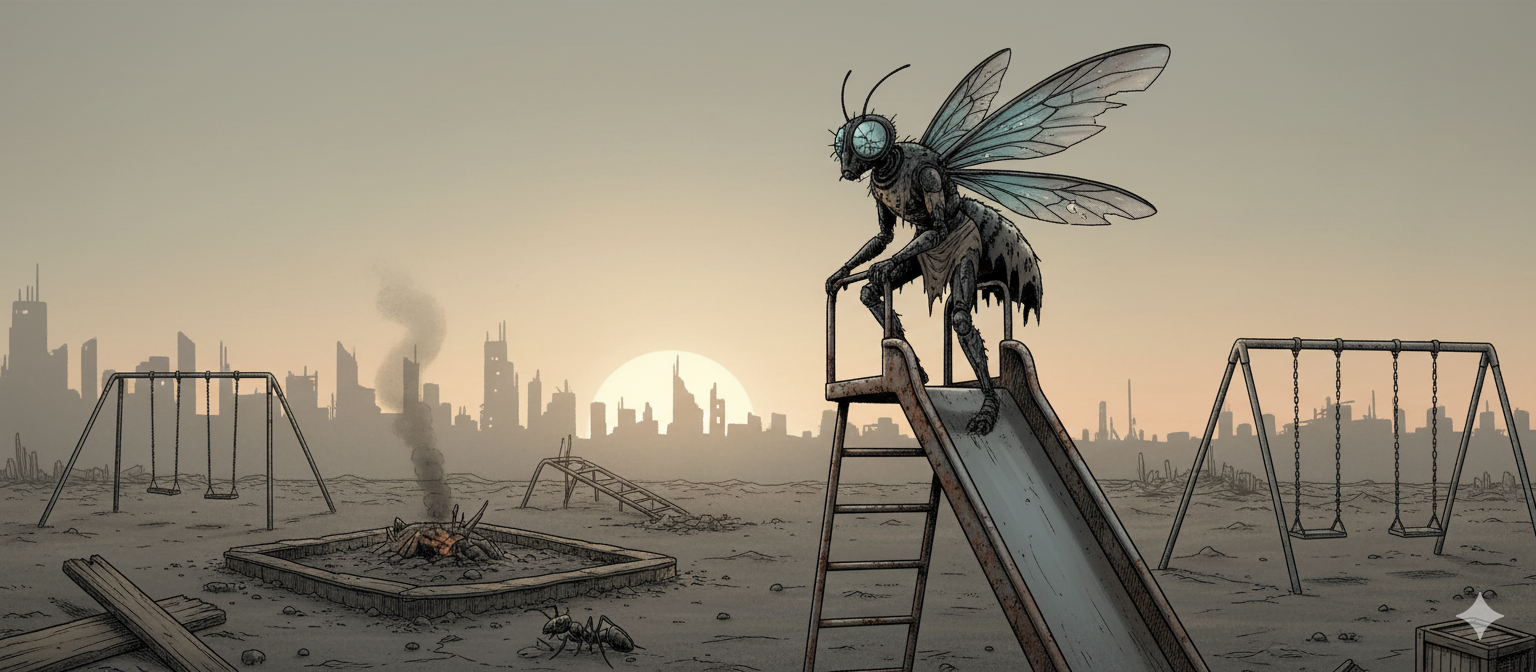Pale Fire
The air over Echo Park Playground was thick with the sweetness of rot and burning resin. The jungle gym stood like a skeleton of colorless metal, swings twisted in the wind, their chains fused by old flame. And over the playground, the flies were singing.
Rax moved through the ash — a humanoid fly with fractured wings and eyes like fractured glass. His body gleamed faintly beneath the soot, a lattice of black chitin patched with human cloth. Behind him buzzed two smaller figures: a dragonfly scout and three worker ants, dragging a cracked container filled with larvae.
The hive was gone. The queen — silent. Only Rax still carried her scent, faint and fading, in the glands behind his throat.
Find warmth, the memory whispered. Find light. Survive the fire.
He watched the horizon glow orange. Humans again — fire-bearers, torchers, cleansing another nest. He tasted the wind with his tongue. Kerosene. Blood. Fear.
The dragonfly scout landed beside him, armor plates twitching. “They burn us again.”
“Always,” Rax answered.
“Then why watch?”
“Because they don’t sing. They only scream.”
They reached the edge of the playground at dusk. Where the sandbox had been, a crater smoldered — filled with blackened husks of what once were larvae. A human stood there, helmet cracked, face streaked with soot and salt. She was crying.
“Please,” she said when she saw Rax. “Please—my child was taken by your kind. Tell me he’s gone quickly.”
Rax tilted his head, wings flicking once. He didn’t understand the words, not all of them, but the tone was familiar — pleading, fragile, full of the same sound the queen made when the fire came. He stepped closer.
The woman flinched, torch rising. The dragonfly scout darted forward, wings slicing through the air. “She burns us!”
The torch fell. Fire crawled along the resin in the sandpit, catching on the still-damp husks. The worker ants shrieked in their clicking speech. Rax moved before he could think — wings flaring, sweeping the flame back toward the woman. She screamed once, then vanished beneath the smoke.
When the fire died, only silence remained. The larvae were gone. The scout was gone. One of the worker ants lay half-crushed beneath a fallen beam, twitching weakly.
“Too much fire,” she said in a voice barely her own.
“Too much freedom,” Rax murmured.
He lifted the beam and ended her pain with a single strike.
When morning came, the ashes were cool. Rax climbed the rusted slide and looked toward the city skyline, faint through the haze. He spread his wings — cracked, charred, one torn — and tried to fly.
For a heartbeat, he lifted from the ground. Then gravity reclaimed him.
He sat there, shoulders heaving, mandibles trembling. Somewhere deep inside, the ghost of the hive sang softly — but the song had changed. It was no longer a chorus. It was a single, broken voice.
“No queen,” he whispered. “No hive. Only Rax.”
And when the wind passed through the ruined playground, the swings moved again — creaking softly, as if applauding the birth of something terrible: a creature that no longer needed orders to burn.
